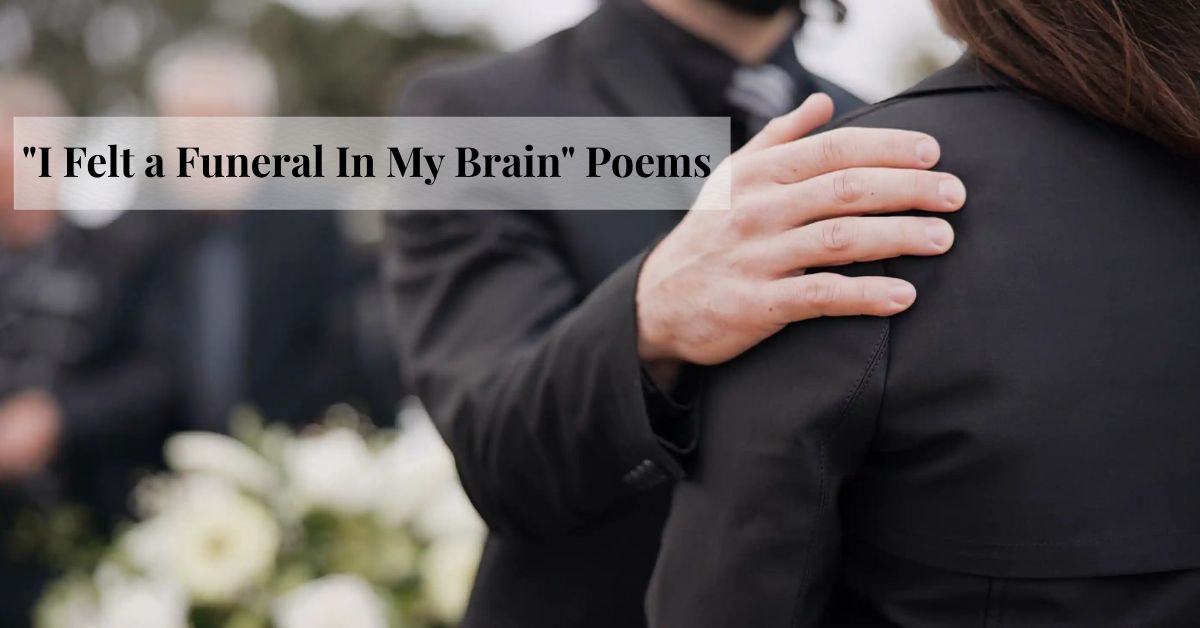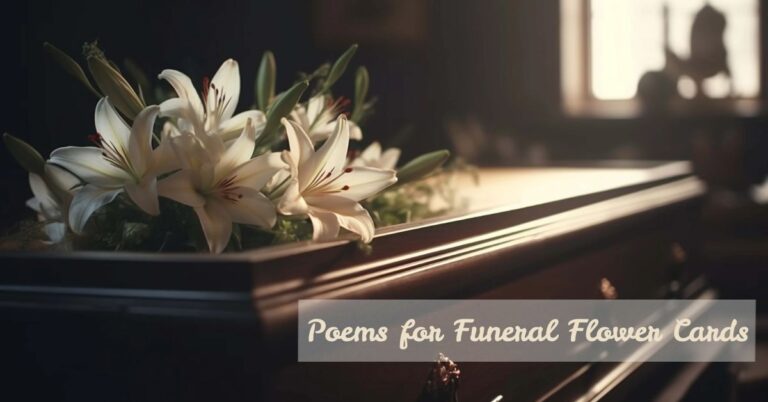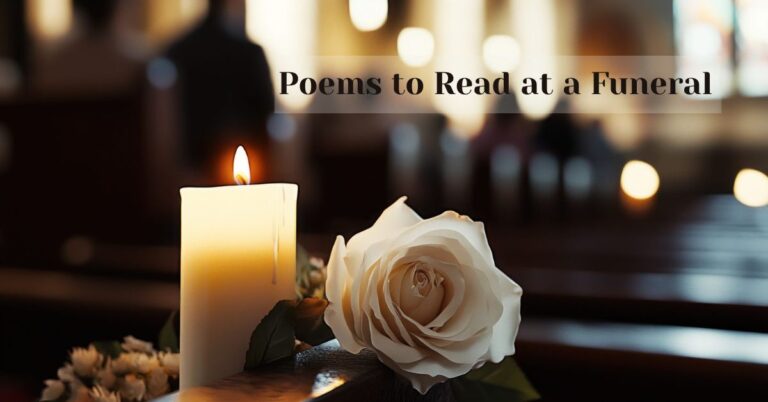Emily Dickinson’s immortal line “I felt a funeral in my brain” remains one of literature’s most visceral depictions of psychological turmoil.
This collection presents original poems that echo her profound metaphor, exploring the dark ceremonies our minds conduct during moments of despair. Each piece illuminates different facets of mental struggle through the lens of funeral imagery and death symbolism.
Original Poems Exploring Mental Funeral Imagery
“The Mourners in My Mind” – A Funeral Procession of Thoughts
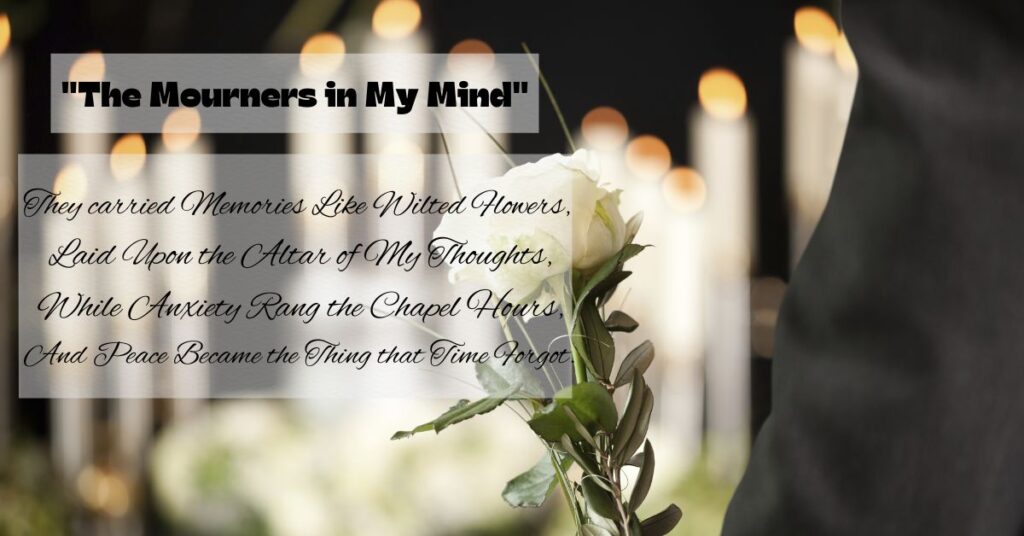
The mourners gathered in my skull today,
Dressed in shadows, whispering fears,
Their footsteps echoed down neural pathways,
Each sob a synapse drowning in tears.
They carried memories like wilted flowers,
Laid upon the altar of my thoughts,
While anxiety rang the chapel hours,
And peace became the thing that time forgot.
This poem captures the overwhelming sensation of intrusive thoughts manifesting as funeral attendees within one’s consciousness. The imagery transforms mental anguish into a tangible ceremony, making abstract psychological pain accessible through concrete funeral symbolism.
“Cortege of Consciousness” – When Sanity Takes Its Final Bow
My sanity rode in a hearse of doubt,
Flanked by vehicles of despair,
The procession wound through synapses throughout,
While reason gasped for mental air.
Behind black curtains, clarity died,
As mourners of the mind stood still,
And logic, once my faithful guide,
Succumbed to madness against my will.
The cortege metaphor illustrates how mental breakdown often feels like a formal procession toward psychological death. This piece explores the systematic dismantling of rational thought processes through the lens of a funeral motorcade.
“Burial Bells in My Skull” – The Tolling of Mental Collapse
Church bells toll within my cranium’s dome,
Each chime a neuron’s final cry,
My thoughts return to their eternal home,
In cemeteries where dreams go to die.
The bronze reverberations shake my core,
Announcing grief’s unholy mass,
While echoes bounce from shore to shore,
Of consciousness trapped behind mental glass.
The auditory hallucination of funeral bells represents the overwhelming nature of psychological distress. This poem demonstrates how mental anguish can manifest through phantom sounds that seem to announce the death of hope and rational thinking.
More Post: 25+ Heartfelt Funeral Poems for a Mother from Daughter
“Pallbearers of Peace” – Carrying Away Tranquility
Six figures dressed in midnight black,
Hoisted serenity upon their backs,
They marched through corridors of fractured thought,
Removing every calm moment I had caught.
The weight of peace proved far too much,
For minds that never learned to rest,
So pallbearers with gentle touch,
Laid tranquility to its final rest.
This piece personifies the loss of mental peace through the imagery of pallbearers removing tranquility from the mind. The poem explores how anxiety and depression can systematically dismantle our ability to experience calm and serenity.
“Graveside Service for Joy” – Eulogizing Happiness
We gathered round the open grave,
Where happiness lay cold and still,
No flowers bloomed, no souls to save,
Just emptiness against my will.
The eulogy spoke of brighter days,
When laughter echoed through my brain,
But now those golden, sunlit rays,
Are buried deep beneath my pain.
Dirt by dirt, we covered light,
With shovelfuls of dark despair,
Until joy vanished from my sight,
And only shadows lingered there.
The funeral service for joy represents the profound loss experienced during depressive episodes. This extended piece demonstrates how happiness can feel permanently buried beneath layers of psychological suffering.
“Cathedral of Chaos” – Where Madness Holds Mass
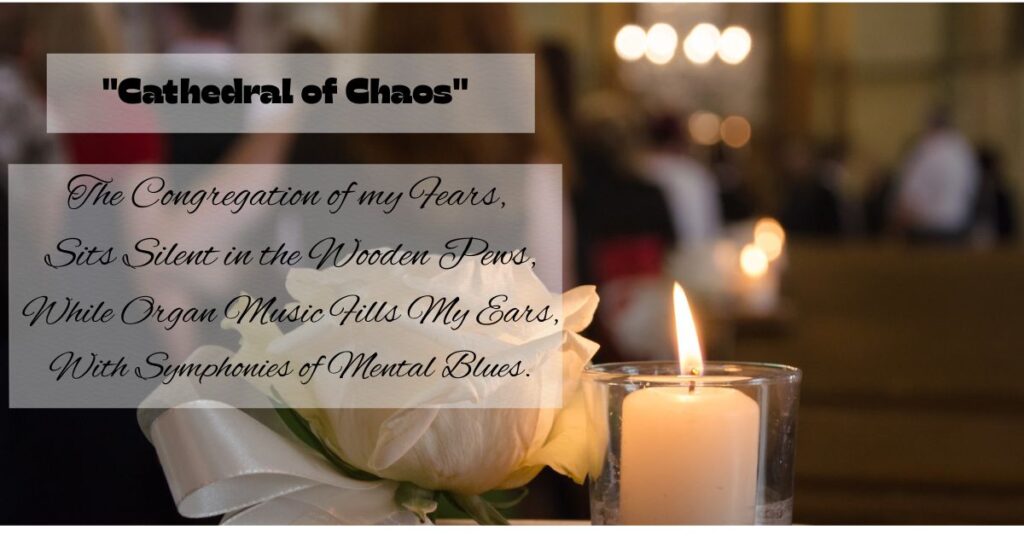
In gothic chambers of my mind,
Where stained glass thoughts cast colored light,
The priest of madness, stern and blind,
Conducts his service through the night.
The congregation of my fears,
Sits silent in the wooden pews,
While organ music fills my ears,
With symphonies of mental blues.
This poem transforms the mind into a sacred space where chaos reigns supreme. The cathedral imagery elevates mental struggle to a spiritual level, suggesting that psychological pain can feel like a religious experience.
“The Hearse of Hope” – Transporting Dreams to Their Demise
Black limousine with silver trim,
Carries aspirations to their end,
The driver’s face appears so grim,
As hope and I can no longer pretend.
Through streets paved with shattered dreams,
We ride toward the burial ground,
Where nothing is quite what it seems,
And silence is the only sound.
The hearse symbolizes the transportation of hope toward its final destination. This piece explores how depression can feel like a one-way journey toward the death of all aspirations.
More Post: 33+Poems to Say Goodbye at a Funeral / Peace Through Verse
“Funeral Hymns in Minor Keys” – Songs of Synaptic Sorrow
The choir of neurons sang today,
In harmonies of hurt and pain,
Each note a synapse gone astray,
Each verse a mind’s refrain.
Their voices rose in minor scales,
Through corridors of conscious thought,
While sorrow’s symphony never fails,
To sing of battles lost, not fought.
Musical metaphors transform brain activity into a funeral choir, demonstrating how mental anguish can feel like a constant, mournful soundtrack playing within one’s consciousness.
“Casket of Clarity” – Burying Understanding Six Feet Deep
They lowered understanding down,
Into the earth of muddled thought,
My clarity wore a thorny crown,
Of all the wisdom I had sought.
The casket gleamed with polished doubt,
While mourners threw their dirt of fear,
Until no light could venture out,
And comprehension disappeared.
This poem depicts the burial of mental clarity during episodes of confusion and cognitive fog. The casket imagery provides a concrete representation of how understanding can feel entombed within a troubled mind.
“Memorial for My Former Self” – Grieving Who You Used to Be
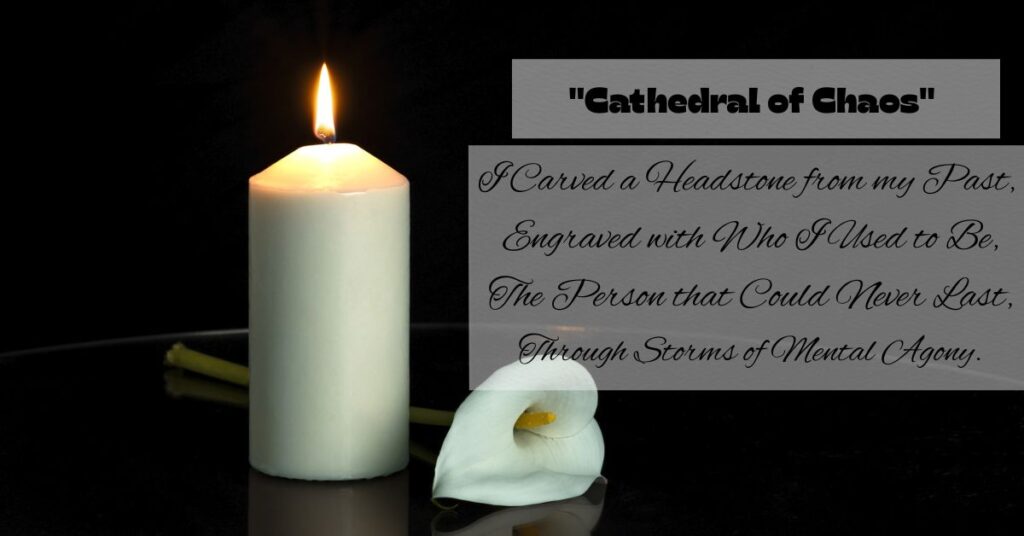
I carved a headstone from my past,
Engraved with who I used to be,
The person that could never last,
Through storms of mental agony.
Fresh flowers mark the sacred spot,
Where confidence was laid to rest,
And visitors remember not,
The soul who once had been blessed.
Here lies the one who laughed with ease,
Who danced through days without a care,
Now buried deep beneath disease,
Of minds that struggle to repair.
This extended memorial piece explores the grief process associated with mental illness. It acknowledges how psychological struggles can feel like the death of one’s former, healthier self.
“The Wake of Wellness” – Saying Goodbye to Mental Health
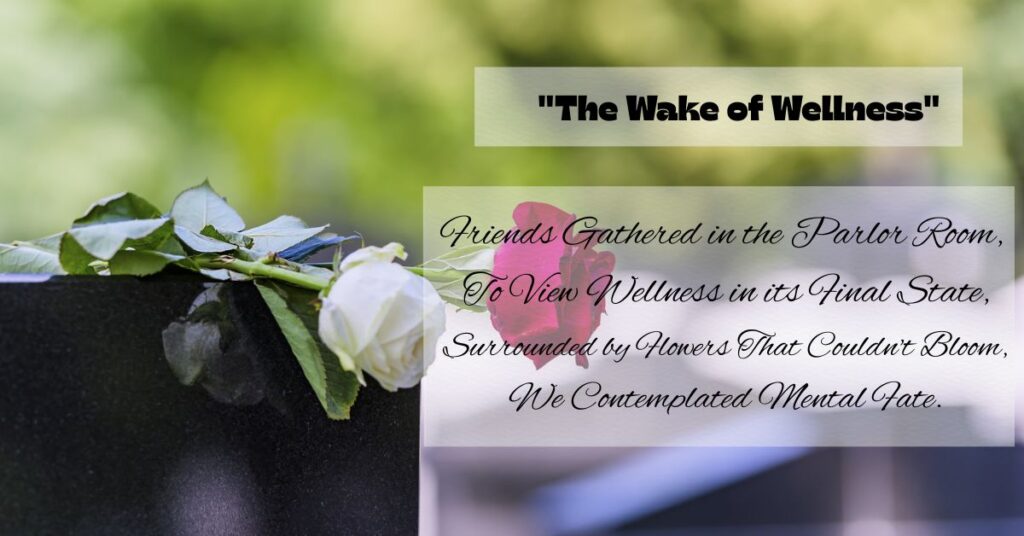
Friends gathered in the parlor room,
To view wellness in its final state,
Surrounded by flowers that couldn’t bloom,
We contemplated mental fate.
Some whispered stories of the past,
When health was vibrant, strong, and true,
But shadows fell, and nothing lasts,
When darkness finally breaks through.
The wake setting provides an intimate space for examining the loss of mental health. This poem explores how psychological illness can feel like attending a viewing for one’s own well-being.
More Post: 33+ Short Poems for Funeral Flower Cards
“Epitaph for Euphoria” – Final Words for Fleeting Happiness
Here lies euphoria, age unknown,
Taken too soon from mortal brain,
She danced alone, she laughed alone,
Until consumed by endless pain.
Beloved by all who knew her well,
Her absence leaves a gaping hole,
Though words of comfort cannot tell,
How much she meant to heal the soul.
The epitaph format provides final words for happiness that has been lost to mental illness. This piece demonstrates how joy can feel like a deceased loved one during depressive episodes.
“Cremation of Confidence” – Reducing Self-Esteem to Ash
Into the furnace of my doubt,
We placed my confidence to burn,
The flames consumed without a shout,
All pride that never will return.
The ashes scattered in the wind,
Of criticism’s harsh refrain,
Where self-esteem had once been pinned,
Now only emptiness remains.
Cremation imagery illustrates the complete destruction of self-worth during mental health crises. The transformation to ash represents how confidence can be reduced to nothing during psychological struggles.
“Funeral March Through Gray Matter” – Steps Toward Psychological Surrender
Left foot, right foot, march of doom,
Through corridors of cerebral space,
Each step brings closer to the tomb,
Where sanity will find its place.
The drummer beats a steady rhythm,
Of neurons firing out of sync,
While thoughts attempt to stay with them,
But tumble toward the mental brink.
Forward motion never stops,
This procession of the mind,
Until finally, everything drops,
And peace, at last, is what we find.
The funeral march provides rhythmic structure to represent the systematic progression toward psychological breakdown. This piece demonstrates how mental illness can feel like an inevitable march toward surrender.
“Tombstone Thoughts” – Monuments to Mental Decay
Granite markers line the rows,
Of memories laid to their rest,
Each headstone marks what no one knows,
The mind’s attempt to pass its test.
Here lies laughter, died age ten,
When bullies stole her precious light,
Here sleeps peace, lost now and then,
To anxiety’s relentless fight.
The cemetery of my brain,
Holds monuments to what I’ve lost,
Each tombstone etched with mental pain,
And calculated at the cost.
This final piece transforms the mind into a mental cemetery where various aspects of psychological health are memorialized. The tombstone imagery provides permanent markers for losses experienced during mental health struggles.
Conclusion
These funeral-themed poems demonstrate how death imagery can powerfully articulate the experience of mental anguish. By transforming abstract psychological pain into concrete funeral ceremonies, readers gain deeper understanding of what it means to feel like something is dying within the mind.
The metaphor of mental funerals validates the profound grief associated with losing aspects of oneself to depression, anxiety, and other psychological challenges. Through shared poetic expression, we find that even in our darkest mental moments, we are not alone in conducting these internal ceremonies of sorrow.

Admin of Wingshup.com, sharing powerful Prayers, heartfelt words, and daily Blessings. Helping you Find peace, hope, and strength through Faith. Simple messages for Spiritual Growth and Comfort.
